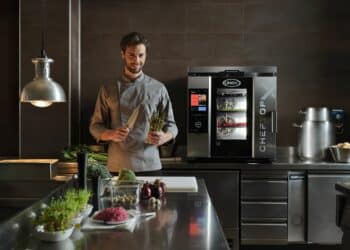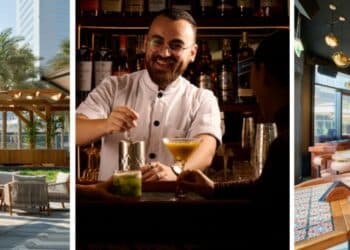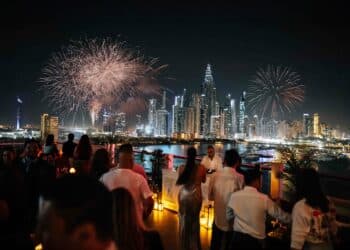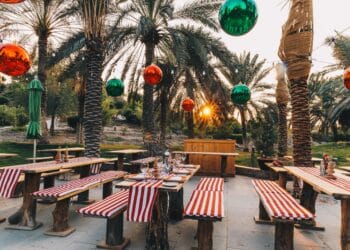During the UAE leg of the Diageo World Class, Catering News caught up with judge and previous winner, Tim Philips, who explains how the cocktail competition has helped to elevate bartending from the status of a part-time trade to that of an aspirational career choice

“Bartending has become a profession. It has gone from being a trade you do while you’re going through university to something you can say with pride that you do,” says Tim Philips, Australian bar owner and 2012 winner of World Class, a prestigious annual competition hosted by Diageo Reserve to identify the world’s best bartender. According to Philips, World Class has been key to elevating the status of bartending by offering talent a global platform to demonstrate their skills, meet the industry’s most important influencers, and work with the highest quality products from the Diageo Reserve portfolio. “I’m in eternal gratitude to Diageo for this competition. They are really putting bartending on a pedestal that has never been seen before and it’s giving affirmation to an industry of people. It’s not just for the 15,000 people that enter every year but the staff that they go on to train,” he adds.
“I tell our staff that people go to bars for atmospherics, great service and great products. If you have all three, then you have a great place and people will keep coming back. If you have two then people will be forgiving, but if you mess up two of those three things then you’re gone. I chase good service and comfort over product”
Philips was in Dubai judging the UAE leg of World Class, which took place on 21 – 22 May 2016 at Grosvenor House Hotel Dubai. In this year’s challenge, Laura Duca, assistant head bartender at Boca Dubai was crowned UAE winner and will attend the global final in Miami in September where she will compete with top bartenders from around the world for the ultimate prize – that of being named the world’s best bartender.
Explaining how it feels to achieve this, Philips says: “You’re being judged by the most important people in the industry, the biggest legends in the game, the former winners, and you’ve made it so far over such a long journey that it’s surreal; you’re stamping yourself on the industry. You go from being someone anonymous in bars, to being someone that everyone knows when you walk in.”
However, bartending wasn’t always the career goal of Philips, who started out polishing glasses in a friend’s countryside pub in Melbourne before he even turned 18. He still recalls peeping out from behind the scenes to catch a glimpse of a customer’s reaction to the first ever cocktail he made. And ten years later, while working at trendy cocktail bar and members’ club, Milk & Honey in Soho, London, Philips admits he did exactly the same thing again.
“Just seeing that first sip and watching them pass it to their friends – that’s all I wanted. I still do it, I’ll serve someone a drink and from the corner of my eye I’m trying to gauge that initial reaction.
“Hospitality is so addictive; I’m addicted to serving people. When someone’s serving you and they think: ‘I’m going to look after you because I’m on your side and you’re going to have a great experience because I’m going to make it happen for you’, that’s true hospitality.”
For Philips however, a great bar doesn’t just rely on the drinks: there are three crucial ingredients to consider. “I tell our staff that people go to bars for atmospherics, great service and great products. If you have all three, then you have a great place and people will keep coming back. If you have two then people will be forgiving, but if you mess up two of those three things then you’re gone. I chase good service and comfort over product,” he says.
Three years ago, Philips decided to create a bar that would encapsulate all three. The 50m2 Bulletin Place in Sydney, which was listed at number 28 in The World’s 50 Best Bars 2015, and according to Philips is “a very humble, underwhelming space”, has just five cocktails on its menu that change every day depending on what can be picked up fresh from the market.
“Our menu is based around classic cocktails with a seasonal injection. It’s a lot of things like Tom Collins gin and homemade lemonade injected with any number of seasonal produce. It sounds like they would be fruity, sweet cocktails but the drinks are really dry and we use really good quality liquor.
“We keep the citrus levels tepid and we try to let the produce sing. You get these drinks that are really super fresh but dry and refreshing – the sort of things you can really put away three of four of in a night,” says Philips.
In addition to seasonality, sustainability is incredibly important to Philips, who says he would “hate to think of it as a trend”, but rather a movement that everyone involved in cocktail creation is getting behind. He offers the example of quince, a fruit that is difficult to use in cocktails, but “if you work hard enough you can get a really good flavour out of it”.
Philips boils the quince for two hours, then removes the skin and pips, and blends the fruit with sugar and citric acid to bring out the flavour. He uses the leftover water as a quince stock and adds spices to it, reduces it down by a third and cuts it with sugar to create a spiced quince syrup, which can be used in an old fashioned with Clavados, a French apple brandy.
“All of a sudden you’ve got this old fashioned variant with bourbon, French apple brandy and sweetened with spiced quince syrup. It’s incredible and you can get two drinks out of the one piece of fruit.”
Another cocktail, the Pineapple Adonis, sees the skin of the fruit soaked in a Fino sherry vacuum for a couple of days before the residual pulp is spread over baking paper with sugar and citric acid added to bring up the flavour.
“We dehydrate it at 60 degrees for 12 hours and essentially what you’re left with is a pineapple jerky with incredible flavour and texture made from a waste product,” Philips explains.
The pineapple flavoured Fino sherry is then stirred down with a dash of orange bitters and a lick of white tequila with the pineapple jerky used as garnish.
“You’ve got this amazing cocktail made from the bi-products of the ingredients, and if you don’t use the pineapple juice by the end of three days then you can cook it down and make it into syrup. We’re trying to maximise the yield of the pineapple.”
Inspired by the Brasilian bars he visited during the 2012 World Class finals, Philips has also created an environmentally-friendly cleaning product using bicarbonate of soda and a touch of vinegar added to leftover lemon and lime juice.
Philips admits he is constantly innovating, and currently is experimenting with bottled cocktails, saying he loves how the packaging can enhance the image of a drink. “If we get the packaging spot on and work with the best people in the industry it’s a match made in heaven and good value,” he says.
Currently Philips is working with a respected barista in Sydney who is creating a special soft coffee blend without tannin for a new winter cocktail, which will include smoked golden syrup, Don Julio Tequila Anejo and a bitter vermouth. However, since Bulletin Place serves cocktail using only the freshest ingredients, the bottled blend will be mainly for Dead Ringer, Philip’s second venue in Sydney, which opened in September last year.
More of a restaurant than a cocktail bar, it has received good reviews so far, however the team is continuing to focus on ensuring it has a successful launch year and doing this, while maintaining the high standards at Bulletin Place, are the main priorities for the team at the moment. “When you open a space so much of your heart, head and time goes into it. If you’re not 100% passionate about the project, you can’t expect customers to fall in love with it,” he says.
And when it comes to growth, he would like to invest in some of his best members of staff who have been there since day one, whether that’s the head chef at Dead Ringer or senior bartender Matt at Bulletin Place. “For them to open their own spaces and build our bars organically so that the family grows, would be great,” he comments.
And while Philips enjoyed working with his previous World Class competitor, Jimmy Barrat at Zuma Dubai when he was in town, he remains dubious about how well a concept like Bulletin Place would be received in the emirate.
“A friend of mine said that if you come up with a cocktail in Dubai it has to be like a happy meal: you can’t just make a nice drink; it has to have something shiny with it or a gimmick. However, that was years ago and things could be changing. I think now people might want things a little more understated.”
Just opening a second location in Sydney, however, was a major step for the team in terms of logistics, and Philips admits that he rejected a location, which at 6km away, was too far to commute from Bulletin Place, so the Middle East might well be a step too far for now.
“The idea of us opening something in Dubai is just frightening. But dream big! If someone wanted to give me some money to open something here, I’d re-think it,” he adds.


































































